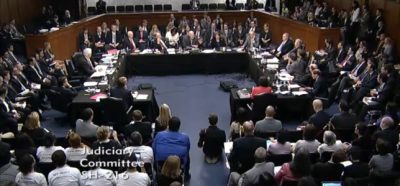Immigration 101
The U.S. immigration system is complex and can be difficult to understand. These resources provide key data points, historical information, and background on hot topics in immigration. Learn the basics about immigration. Immigration in the United States is complex and ever-evolving. Start here to understand the fundamental aspects of immigration policy, its history, and its impact on both individuals and the country at large. Learn commonly used terms about immigration law and how the U.S. immigration system is designed. Explore layered topics like how and whether immigrants can become citizens, as well as what individual protections look like under the law.
How the United States Immigration System Works
- How the Immigration System Works
- June 24, 2024
U.S. immigration law is very complex, and there is much confusion as to how it works. This fact sheet provides basic information…
Read More
Birthright Citizenship in the United States
- Birthright Citizenship
- October 16, 2024
This fact sheet explains birthright citizenship, the Fourteenth Amendment, and its interpretations. Who is…
Read More
Asylum in the United States
- Asylum
- August 27, 2014
Asylum seekers must navigate a difficult and complex process that can involve multiple government…
Read More
Former Attorney General Gets it Wrong on DOMA and Same Sex Immigration Benefits
Former Attorney General Alberto R. Gonzales is advocating in the New York Times that the Supreme Court decision in U.S. v. Windsor, which invalidated Section 3 of the Defense of Marriage Act (DOMA), should not allow the Obama administration to afford immigration benefits to married, same-sex bi-national couples. Rather, he argues, the administration is bound by a disturbing, 30-year-old Ninth Circuit case, Adams v. Howerton, which rested on discriminatory and outdated law and facts. Essentially, Mr. Gonzales is urging that the administration ignore 30 years of social progress and legal developments and return to a 20th century mentality and jurisprudence. He is mistaken. Read More

Supreme Court’s DOMA Decision Good for Economic Competitiveness
In the global economy of the twenty-first century, a globally mobile workforce is critical to remaining competitive. Yet for LGBT employees, their families, and their employers, significant barriers remain in place. The Supreme Court’s June 26 decision in United States v. Windsor finding part of the Defense of Marriage Act (DOMA) unconstitutional has clear and direct benefits for married same-sex couples, including bi-national couples. But beyond the benefits to married couples themselves, the Court’s decision is also a win for economic competitiveness. Specifically, the DOMA ruling makes U.S. businesses more globally competitive because they now can attract and retain foreign-born employees who want to stay in the United States with their same-sex spouses. Read More

USCIS Approves First Green Cards for Same Sex Couples
On June 26, the Supreme Court issued its decision in the case of United States v. Windsor, in which it struck down section 3 of the Defense of Marriage Act (DOMA), which defined marriage as between a man and a woman for all federal laws. This law meant that the immigration agencies would not recognize lawful, same-sex marriages for any immigration purpose. Since the Court’s decision, the Obama administration has moved rapidly to allow U.S. citizens to petition for immigration benefits for their spouses, providing hope to an estimated 28,500 bi-national same-sex couples in the United States who might otherwise be separated by our immigration laws. Read More

Supreme Court Strikes Down DOMA, Affirms Immigration Rights of Gay and Lesbian Couples
Today, the Supreme Court issued its decision in the case United States v. Windsor, striking down section 3 of the Defense of Marriage Act, or DOMA, on the basis that it violated equal protection under the due process clause of the 5th Amendment. DOMA established an exclusively heterosexual definition of “marriage,” and denied same-sex couples any federal benefits, including immigration benefits. This is a historic day for gay and lesbian marriage rights, as DOMA disqualified same-sex couples from over a thousand federal benefits, and made same-sex couples in committed relationships second-class citizens in the eyes of the federal government. Read More

Crafting a Successful Legalization Program: Lessons From the Past
One of the themes that emerged from the Senate Judiciary Committee mark up of the 2013 Senate immigration bill was the necessity of avoiding the mistakes of the past. In the context of legalization for the 11 million unauthorized immigrants now in the United States, the argument is often made that the 1986 law wasn’t tough enough, and any new legalization program should have more requirements and restrictions. However, in my 39-year career with the Department of Homeland Security (DHS) and former Immigration and Naturalization Service (INS), and after years of studying implementation of the 1986 law, I’ve reached a different conclusion. A successful legalization program depends on simplicity and common sense. There are many lessons to be learned from the 1986 law about how to design a better legalization program. Fortunately, many of those lessons have been absorbed by the drafters of S. 744, the Border Security, Economic Opportunity and Immigration Modernization Act. Nonetheless, as the debate continues on this bill, it is important to reiterate the importance of good design and thoughtful implementation. That is what will ensure success and provide the country with a working immigration system. Read More

Medicare’s Health and Well-Being Depends on Immigrants
Immigrants’ access to affordable health care is one of the most contested issues in the current immigration reform debate. Most advocates of comprehensive immigration reform point to the need to ensure that aspiring citizens have opportunities to access appropriate health care since such access will impact their ability to learn, to work, and to contribute to their communities. On the other end of the spectrum, anti-immigration groups tend to inaccurately emphasize that newly legalized immigrants would represent an excessive fiscal burden. This prediction is based on a misleading characterization of immigrants as “takers”—in other words, as disproportionate consumers of public resources. Several studies have shown that this is just not the case. In fact, non-citizens use public benefit programs at a lower rate than similar low-income native-born citizens. With regard to medical expenditures in particular, immigrants tend to use less health care than their U.S.-born counterparts. Read More

What Does the Success of the Mark-Up Tell us About the Coming Full Senate Vote on Immigration?
One year ago, with the presidential race in full swing and proponents of self-deportation making the headlines, it would have been difficult to predict the extraordinary vote that took place Tuesday in the Senate Judiciary Committee. Ten Democrats and three Republicans voted to pass S. 744 out of committee and send a comprehensive immigration bill to the Senate floor. This could never have happened without the overwhelming support for immigration reform that the public has shown, particularly since the November 2012 election. Even with that support, however, there was no guarantee that the long, slow process of negotiating and drafting a bipartisan bill that could succeed in committee (and then the Senate floor) would ever come to fruition. And once a bill is introduced, getting it through committee requires a mix of political acumen to keep the bill alive. Read More

Passport Pages Tell Our Tale
Today in the United States, Lesbian, Gay, Bisexual, and Transgender (LGBT) Americans who fall in love with and marry foreign nationals are being asked to choose between country and spouse, country and career, and country and family. I know this because I have spent the last several years in a battle with my own government to recognize my wife for immigration purposes. Trying to keep my marriage to a British national together has cost me my career and a full pension, time away from my American family and friends, as well as a great deal of stress over finances and my future. Gay Americans who are legally married in the U.S. have a marriage that is not recognized by the federal government. Therefore, the 28,500 same-sex binational couples in America, in which one spouse is an American citizen, are in a situation where they cannot sponsor their husbands and wives for immigration purposes. This also means they do not receive the 1,138 federal rights, benefits, protections, and obligations that automatically come with marriage and serve to protect and support families. Read More

Former Bush Administration Official Explains Why Immigration Bill Is Good For The Economy
Following the introduction of the Senate immigration reform bill earlier this week, the Senate Judiciary Committee held its first hearing about the measure today. It gave the senators a chance to air their various complaints about the bill – that it does not protect LGBT couples or that the bill micro-manages the hiring process for foreign workers – but largely, committee members asked about the ways immigration reform will impact the U.S. economy, from the agriculture industry to high-skilled industries. Read More

The Associated Press Stylebook Drops “Illegal Immigrant,” The Times Debates Following Suit
On Tuesday, the Associated Press (AP) posted a blog saying that they are no longer going to advise writers to use the term “illegal immigrant” in the stylebook. The AP stylebook is considered the standard among American journalists, so the change is likely lead to a marked drop in the use of the controversial term over time. On Wednesday, as responses to the AP’s decision were still coming in, the New York Times blogged that they, too, are reconsidering the use of the term, though the Times’ public editor Margaret Sullivan said she did not expect them to completely “ban the use of “illegal immigrant,” as The A.P. has done.” Read More
Make a contribution
Make a direct impact on the lives of immigrants.

